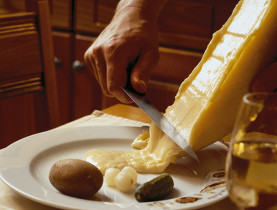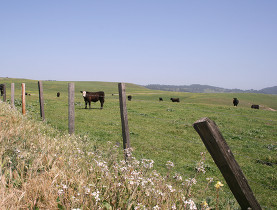Swiss quick to move into Slow Food fast lane

The Slow Food movement has moved into high gear recently with a spate of books and films raising awareness of the dangers of a fast food diet for humans and the planet.
However, the Swiss – as recent studies show – may need less convincing of the benefits of a wholesome meal than the people, for instance, in France or the United States.
Over the past few years, books including Fast Food Nation and The Omnivore’s Dilemma exposing the devastating impact of the industrial food system on the environment, farm animals and society have been bestsellers, spawning films such as the documentaries, Super Size Me and Food, Inc.
But shock tactics have not been necessary in Switzerland. The message on the benefits of local, seasonal and sustainably grown food is delivered to Swiss households each week, packaged inside the newspapers of the two leading retailers, Migros and Coop.
These free weeklies reach one in every three Swiss. And the Coop version is particularly well known for its focus on the benefits of buying organic and local.
Indeed, Coop has played a key role in the Slow Food movement since the early 1990s when it first placed organic products on its shelves. It was a decision that proved a breakthrough for chemical-free foods, putting them for the first time on the plates of the average Swiss family.
One-upmanship
Since then, Coop and Migros have played a game of one-upmanship, introducing a plethora of labels, or promoting internationally recognised ecological or sustainable standards (see key facts).
While there has been a steady rise in sales of products bearing these labels, eco-sustainable foods still only account for about one in every ten products sold in Switzerland.
However, Mirjam Hauser, co-author of the European Food Trends Report at the Gottlieb Duttweiler Institute, sees the sales curve continuing upward.
“There is a trend to much more conscientious consumption,” Hauser told swissinfo.ch. “Sales of regional or organic products, or fish and meat produced following specific criteria have been increasing, and will continue to grow.”
Loss of trust
She says there have been two large developments driving the trend: loss of trust on the part of consumers external factors such as rising food prices because raw materials are becoming scarcer over time.
This leads to a new awareness, according to Hauser, that high-quality goods cannot be sold at discount prices. In the long-term, she says, this will raise the standards of conventional, mass products.
For Ursula Hasler of the Swiss branch of the international Slow Food organisation, small is beautiful.
“The big supermarkets here are nowhere as big as those in neighbouring countries,” Hasler says. “That helps regional producers put their products on the shelves.”
Switzerland’s regional focus has been aided by protective customs and duties as well as restrictions on imports, while American or French consumers often have a hard time discerning the origin of the countless goods on the shelves of their mega stores.
“Over the past 20 years, the main Swiss retailers have indicated on the packaging that, for instance, these vegetables come from local farmer X or Y,” Hasler told swissinfo.ch.
Home-grown greens
Coop is a case in point, claiming that 70 per cent of all its food items bearing a Coop label come from Swiss producers while common fruit and vegetables like carrots, potatoes and apples are almost exclusively home-grown, as is its pork.
The trend has not been lost on McDonald’s Switzerland, which promotes the fact that the beef, flour and potatoes used in its hamburgers, buns and chips are Swiss. The fast-food chain is now under pressure from the country’s main animal rights organisation to stop buying chicken and dairy products from factory farms abroad.
Another sign of the times is a marketing partnership between the national tourist office, Switzerland Tourism, and the country’s best known cookbook publisher, Betty Bossi (50 per cent owned by Coop).
Switzerland Tourism helped launch Betty Bossi’s latest publication, The Swiss Cookbook. The kickoff event was not held in a restaurant or kitchen, but the Sihl Forest near Zurich, the closest thing Swiss urbanites have to a wilderness area.
Journalists were given a “sense” of traditional Swiss cooking by smelling and tasting indigenous herbs that make up part of the forest undergrowth.
Hauser says Coop’s introduction of a Slow Food label, in cooperation with Slow Food Switzerland, also indicates that eco-sustainable food is catching on.
This has created a dilemma for her organisation, Hasler adds: “It has helped Slow Food become better known, but for many people Slow Food is now a label and not a movement.”
Dale Bechtel, swissinfo.ch
Swiss food labels:
– Organic (Migros/Coop)
– Semi-organic (Migros/Coop)
– From the Region (Migros)
– Pro Montagna (products from Swiss alpine farms – Coop)
– MSC (seafood from sustainable fisheries – Migros/Coop)
– Fair Trade (Migros/Coop)
– Slow Food (Coop)
– ProSpecieRara (traditional animal breeds, fruit/vegetable varieties that have been marginalised – Coop)
Slow Food began in Italy in 1986 with the foundation of its forerunner organisation, Arcigola, to resist the opening of a McDonald’s near the Spanish steps in Rome. The Slow Food organisation spawned by the movement has expanded and now has over 100,000 members with chapters in over 132 countries.
According to the international Slow Food organisation, everyone has “the responsibility to protect the heritage of food, tradition and culture… We believe that the food we eat should taste good; that it should be produced in a clean way that does not harm the environment, animal welfare or our health; and that food producers should receive fair compensation for their work”.

In compliance with the JTI standards
More: SWI swissinfo.ch certified by the Journalism Trust Initiative














You can find an overview of ongoing debates with our journalists here . Please join us!
If you want to start a conversation about a topic raised in this article or want to report factual errors, email us at english@swissinfo.ch.